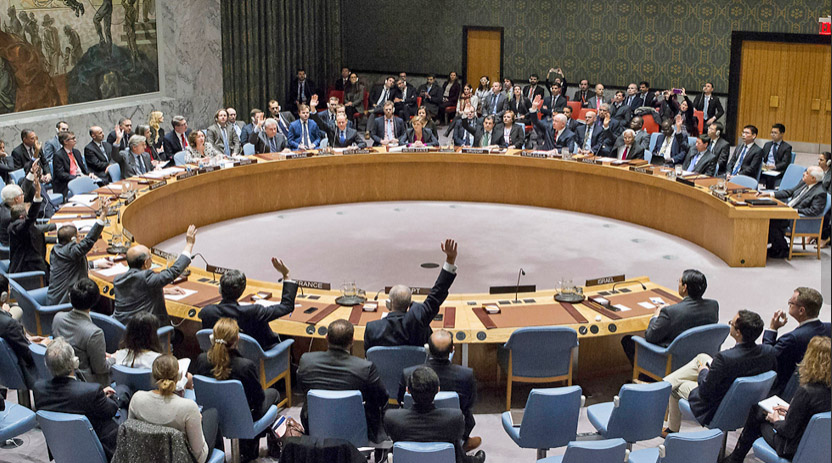Australia/Israel Review
Scribblings: Was Resolution 2334 anti-Israel?
Feb 1, 2017 | Tzvi Fleischer

Tzvi Fleischer
Defenders of controversial UN Security Council Resolution 2334 – passed with the apparent connivance of the departing US Obama Administration on Dec. 23 – claim it was “not anti-Israel” but only “anti-settlement.” It was merely critical of the policies of the current Israeli government, they say.
That may appear to make sense – but only if your definition of “anti-Israel” is limited to calling for Israel’s destruction. Admittedly, the resolution did not do that. However, it did basically solely blame Israel and its settlements for the lack of peace in a completely unfair and illogical way while making no demands of the Palestinians except for a vague call for both sides to refrain from terrorism and incitement. And it is not just supporters of the current government who think it was anti-Israel – many senior opposition figures have publicly made it clear they also see it in these terms.
In some examples compiled by Hillel Neuer of UN Watch:
- Isaac Herzog, Leader of the Opposition and Chairman of the Labor Party called for Resolution 2334 to be annulled, saying it caused “severe damage.”
- His colleague, former Foreign Minister Tzipi Livni who led efforts to achieve a two-state solution with the Palestinians for several years, said that 2334 “harms the interests of Israel,” “harms Jerusalem,” and threatens to haul Israeli officers before the International Criminal Court.
- Yair Lapid, chair of the Yesh Atid opposition party, who has endorsed the Saudi-Arab Peace Initiative as a basis for peace talks, called the UN resolution “dangerous”, “unfair”, and “an act of hypocrisy.”
- Ehud Barak, the Labor Prime Minister who at Camp David in 2000 extended a far-reaching peace offer to the Palestinians, called this resolution a “humiliating blow to Israel.”
- Gen. (ret.) Amos Yadlin, head of Tel Aviv University’s Institute for National Security Studies, and the Labor party’s candidate for Defence Minister at the last election, said that the resolution was “extremely problematic for Israel and the peace process alike,” and accused President Obama of committing “a severe anti-Israeli move”.
Now to be clear, as you would expect from opposition leaders, all of these individuals also blamed the Netanyahu Government for allegedly mishandling relations with the US Administration, leading to the passage of this resolution. But that does not change the fact that they all saw it as both anti-Israel and a blow to peace hopes.
So you cannot argue that it is directed only against the current Israeli government. Indeed, the major target of this resolution was construction in settlements, and contrary to frequently-made but erroneous claims, statistics show that, since Netanyahu became PM in 2009, his governments have, on average, allowed less construction in settlements than any of its recent predecessors under Olmert, Sharon, and Barak.
An amazing success story
I have written extensively before in this column about the considerable, but under-reported, efforts made by recent Israeli governments to improve the integration and equality of the Israeli Arab minority, and the evidence that it seems to be working. Here is some more encouraging evidence.
A 2016 Survey by the Israel Democracy Institute asked Israeli Arabs to choose their primary identity among Israeli, Palestinian, Arab, and religious (Muslim/Christian/Druze). While a plurality (29%) chose their religious faith as their core identity, more chose Israeli (25%) than either Arab (24%) or Palestinian (12%). Palestinian was actually the least popular option. That same poll asked respondents how proud they were to be Israeli – a majority of Israeli Arabs answered with expressions of positive pride in their Israeliness, with 16.5% saying “very much” and another 39% saying “quite a lot.”
Plus, here are some good hard statistics, provided by Mohammad Darawshe, Director of the Centre for a Shared Society at Givat Haviva, on the material side of the evidence ledger. While Arabs make up 21% of the Israeli population:
- 23% of Israeli doctors are Arabs
- 46% of Israeli pharmacists are Arabs
- 28% of hi-tech students at the Technion, Israel’s top engineering and hi-tech university, are Arabs
- 16% of the students in all of Israeli higher education are Arabs. (Yes, that’s still less than their percentage of the population but is way up from only 8% a decade ago.)
Similarly, there have been major improvements in Israeli Arab standards of living reflected in polls – the share of Arab families that said they were “very satisfied” with their economic condition rose in polling from 40% in 2004-2005 to 60% in 2010-2011. Meanwhile, there have also been real improvements in Arab numbers in civil service positions (10% of Israeli judges are now Arabs, and more and more Arab teachers are teaching in Jewish schools), in Israel’s booming hi-tech sector, and in popular culture, where Arab actors, comperes, authors and Arab-themed TV dramas are all becoming a routine part of the Israeli mainstream.
Indeed, the degree of this integration – and the way Israeli Jews and Arabs, despite their differences, are growing to share much in common and resemble each other – is reflected in another minor but telling poll result pointed out by retired law professor and former cabinet minister Amnon Rubinstein (Jerusalem Post, Jan. 12). In the Arab world, homosexuality is strongly frowned upon. Asked “whether society should accept homosexuality” in a Pew poll in 2013, 97% of Jordanians, 95% of Egyptians, and 93% of residents of the Palestinian Authority said no. Yet in a different poll, fully 45% of Israeli Arabs supported full equality for gays.
While of course still a work in progress, the saga of the growing integration and improved welfare and equality of Israeli Arabs over recent years is actually an amazing success story – it’s just too bad so few seem willing to tell it.
Tags: Israel






